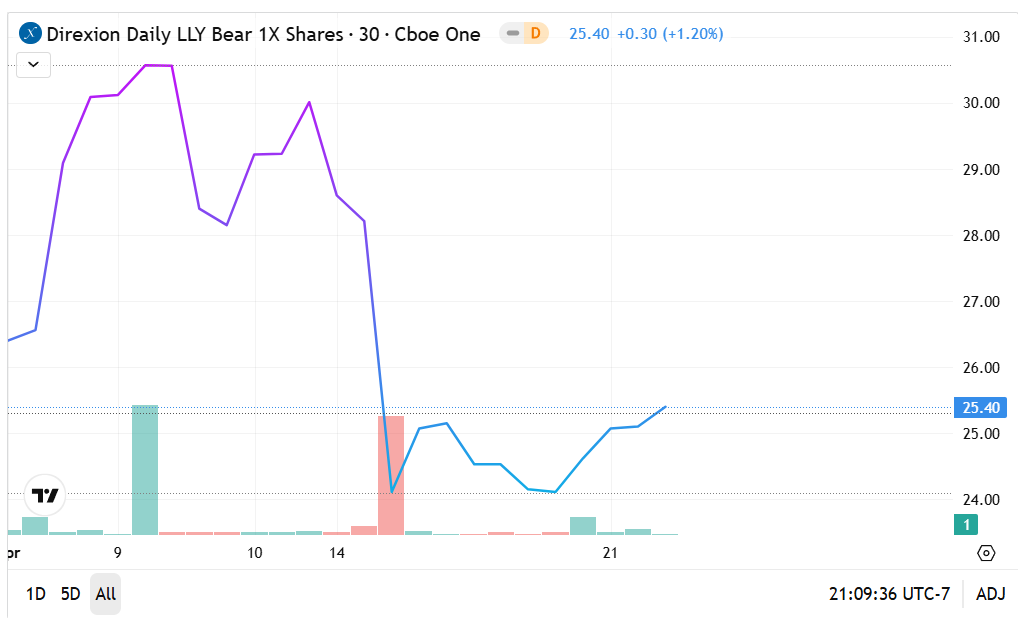
Amid a challenging political and economic environment, pharmaceutical giant Eli Lilly and Company (NYSE:LLY) may offer a potential haven in the storm. Fundamentally, the healthcare sector is generally resilient to recessions for a simple reason: when people fall ill, they may need medication and specialized treatment, irrespective of economic conditions. After all, health without wealth doesn't mean much.
In addition, chronic conditions don't pause for bear markets – they occur when they occur, forcing patients to adjust. From a matter of pragmatism, healthcare companies (especially drugmakers like Eli Lilly) can benefit from stable revenue streams, even during downturns. Furthermore, demographic realities, such as the aging U.S. and even global population, translate to healthcare consumption structurally rising.
Indeed, one of the biggest catalysts for LLY stock is its obesity drug orforglipron. Recently, analysts at Cantor Fitzgerald initiated coverage on Eli Lilly, noting the pharmaceutical giant's potential for dominating the obesity sector. Last week, the company reported topline phase 3 results of the drug for adults with type 2 diabetes. The study's first phase met the primary endpoint of superior blood sugar reduction compared to placebo.
Even better, the enthusiasm hasn't gone unnoticed among the big-money crowd. Recently, traders bought nearly $77,000 worth of call options with an Aug. 15, 2025, expiration date. As a debit-based transaction, the purchased calls represent "active" speculation as LLY stock must rise beyond the net premium paid for the trade to be profitable.
Nevertheless, not everything about Eli Lilly has resonated with the investing public. Perhaps the biggest concern right now centers on the valuation. Presently, LLY stock trades hands at nearly 71 times trailing earnings, which some investors might deem too rich. In addition, LLY trades at more than 52 times book value, a noticeable uptick from years past.
The Direxion ETFs: Another structural concern about engaging LLY stock, whether from the long or short angle, is the share price. At over $800 a pop, LLY has become expensive and thus unwieldy. Even one option contract – which controls 100 shares – now leverages a considerable amount of money, making small trades impractical. That's where financial services provider Direxion offers an alternative pathway.
Speculators have two avenues. First, optimists may consider the Direxion Daily LLY Bull 2X Shares (NASDAQ:ELIL), which seeks the daily investment results of 200% of the performance of LLY stock. Second, pessimists may examine the Direxion Daily LLY Bear 1X Shares (NASDAQ:ELIS), which tracks 100% of the inverse performance of the namesake security.
Both exchange-traded funds mainly offer convenience for traders, who may desire either a leveraged long position or a short trade without engaging the complexities of the options market. Furthermore, Direxion ETF shares (or units to be more accurate) trade just like any other publicly traded security.
However, the caveat is twofold. Primarily, prospective investors must recognize that leveraged and inverse ETFs can be quite volatile. Also, these specialized ETFs are designed for exposure to last no longer than one day. Beyond that, volatility decay can occur due to the daily compounding problem.
The ELIL ETF: A new financial instrument, the ELIL ETF finds itself down almost 4% since its late-March debut. While choppy, near-term circumstances appear to bode well for the bull fund.
- LLY stock over the past six years generally features an upward bias, with the chances of a long position held for one week being profitable clocking in at around 58%.
- In the past couple of months, LLY has printed five up weeks and five down weeks, with the overall trajectory being positive. This setup generally leads to positive outcomes, possibly boding well for ELIL.

The ELIS ETF: Appearing in the market at the same time as its bullish counterpart, the ELIS ETF has also encountered a rough start, losing about 3% since its debut.
- Without adequate baseline data, it's difficult to gauge forward movement. That said, when looking at LLY stock, the printing of a possible bullish flag in the chart warrants caution for ELIS.
- Given current trends, it would not be surprising for LLY to drive higher over the next three weeks. However, it's possible that valuation concerns may start to drag on the security, making ELIS potentially intriguing.
